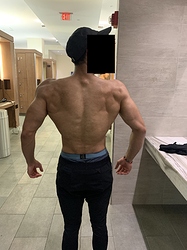Hey Tnation,
I started training & lurking in this forum back when I was 14 (a decade ago), and joined shortly afterwards (age 15, 9 years back). Having recently celebrated my 24th, I’ve officially been in the game for a decade… Hard to believe, but time marches onwards. It’s been quite a journey – here’s some of the stuff I’ve done:
- Ate like a moron for a year (carbophobia)
- Ate pretty damn well for 5+ years
- Dieted down for photoshoots twice, reached ‘photoshoot leanness’ many many times
- Became a power-to-weight ninja (national powerlifting coach wanted me to compete at nationals)
- Tore my quadratus lumborum on an ego lift and relinquished my power-to-weight ninja title (tingles/numbness in lower back and right leg for months)
- Trained high volume, low volume/high intensity, high frequency, low frequency etc.
- Got really fit (cardiovascular, V02 max, etc)
- Got really unfit
- Been obssessed
- Been rather laissez-faire
- Built a decent physique (by my standards/aesthetic sensibilities)
- Read way way way too much about this stuff (but I love it)
Currently? I’m ‘refining’ my physique (chasing my own sense of aesthetics): more shoulders and arms, slightly smaller quads (this is a whole adventure), and rebuilding my chest (the one body part that lost meaningful size/strength during the coronavirus lockdown).
I wanted to share some of my ‘learnings’ from the journey thus far-- feel free to agree, disagree, tell me I’m an idiot, etc – looking for thoughts from the community! In no particular order:
-
I can look good (very lean) or I can be strong. Can’t do both.
-
Feels incredible to be strong and a little fluffy (I mean ‘less defined abs’, not ‘fat’)
-
Being lean feels ‘fine’ until a particular threshold. I haven’t yet figured out whether that threshold is defined by ‘amount of fat on my body’ or ‘calories I’m consuming to facilitate the amount of fat on my body’, but, after crossing the threshold, it just feels shitty.
-
There is, truly, no such thing as an ‘essential exercise’, but I think that the lessons learned from the big 3 are imperative for anyone starting the journey. It’s too easy to train casually on machines and isolation exercises; squats & deads teach the work ethic that should be carried over.
-
You don’t actually have to train hard always. My ‘obsession’ with this aspect of life waxes and wanes. During periods of intense interest, I train very hard, and do progress faster. BUT, even when training is at the back of my mind, and training sessions are just about ‘getting it done’, there’s always more muscle and a better physique on the other end.
-
For building muscle, a calorie surplus is highly overrated. I’m convinced that maintenance gets it done.
-
For strength, a calorie surplus is king.
-
Getting lean is as simple as ‘reduce your food until you feel slightly hungry’. If you really want to cover your bases, I’d add just two caveats: 1) get your protein in 2) keep lifting the same weights (of course, trying to progressively overload, as always)
-
For hypertrophy, I think that getting stronger is overrated. It’s too easy to demonstrate more strength over time with improved technique, faster reps (no juicy pause), better CNS recruitment, etc. IMO, hypertrophy is all about getting a pump in a ‘not stupid’ rep range, then holding that pump throughout the session, pushing it till the muscle burns. To build more muscle, keep doing that, trying to push a little harder each time.
-
Relatedly, chasing bigger numbers is a great way to derail if your goal is more muscle. If you can’t feel the muscle working, I don’t think much hypertrophy is taking place…
-
Building muscle when deep in a deficit is really difficult because it’s so hard to get (and keep) a pump while flat.
-
For physique transformation, there are basically two axes that really seem to matter – caloric intake and total activity. There is a version of you on 4000kcal daily and 4x weekly lifting sessions + 3x weekly conditioning sessions + NEPA. There is also a version of you on 2500kcal daily and 4x weekly lifting sessions. Imagine a 2D matrix with every possible combination of calorie intake and daily activity configuration. Pick the cell that likely best suits your goal physique, do that, and your body will change over time to match. This is a fancy way of saying: ‘If you want to look like someone who lifts a lot, then lift a lot’. ‘If you want to look like someone who can lift a lot and run up a mountain, then lift a lot, run up mountains often, and fuel the activity accordingly’.
-
You can perform (in training) on little sleep… But life is much better when you sleep enough.
-
It’s really worthwhile to maintain conditioning. Training feels so much better, and it’s so much ‘easier’ to push hard when the cardiovascular ‘challenge’ of a lifting session is trivial.
-
No need to force boring cardio. If LISS is too tiresome to bear, then do something else. I love my weekly boxing and conditioning circuits.
-
If you want X to get bigger, train X directly.
-
You don’t need to train abs to see them… but they look much better if you do.
-
Once you build your conditioning and overcome the initial inertia of a session, aerobic and anaerobic work feel really really good.
-
When getting lean, a calorie is absolutely not a calorie. Get very lean on a low volume, high caloric-density diet of poptarts, protein powder, and peanut butter. I’ll wait.
-
Relatedly, nutrition isn’t too important at maintenance or when in a surplus. When in a deep deficit, every choice counts (yes, this one is obvious, the opportunity cost of a calorie spent is high when you don’t have many to spend)
-
I feel better when I eat a ton of fruit & vegetables.
-
Thinking about fruit sugar is not worth the time.
-
Carbs are excellent. Eat carbs.
-
You can drink a lot of alcohol once per week and it won’t really affect your results. Just be smart and balance the calories.
-
If you get a serious injury, you’ll save yourself a lot of pain if you just let it recover.
-
If you train because it feels good and you enjoy it, little ‘vanity’ purchases can make it even more fun. A good non-stim ‘pump’ preworkout does make a difference to the pump during a session, and feels excellent. Using a normal pre every now and then, so you can roll into the gym bouncing off the walls on a stimulant high also feels excellent. Buying new training clothing is awesome. Obviously these are all just icing on the cake (and I’m personally very opposed to frequent use of a preworkout supplement – stim tolerance/adrenal fatigue SUCKS).
-
One of the biggest gifts bestowed by a long time spent training is the control and awareness of one’s own body. You can flex muscles that people don’t even realize they have. You can execute brand new movements with nearly flawless form. You know when you’re eating too much, or too little. You can tell whether your body is tired, or if it’s just your mind. Ultimately, your body is goddamn reliable. It does the things you want it to do (run there, lift this, contort ‘like so’) and it does them well.
-
Unless you’re competitive in some manner, the minutiae really don’t matter, but they can be fun. I’m sure that they do improve results, I just don’t think they’re worth the life/time tradeoffs for non-competitive recreational lifters; unless you enjoy them for their own sake!
-
Unless you’re competitive in some manner, focusing on ‘pursuit of progress’ is probably a bad long-term strategy. It’s not resilient to setbacks, and the bottom falls out when age related decline starts to set in (not there yet personally). It can also expose you to additional mental health stresses: if work/life is tough, the last thing you need is to start beating yourself up because you’re not improving in your recreational passion/hobby. It’s probably better to focus on the experience that you enjoy. You don’t train ‘to improve’. You train because ‘it’s one of your favourite things to do’. Progress can be a side effect of the latter.
Sweet. That’s it for now. This place has changed so much over the years, for better and worse. There’s less pseudo-masculine posturing and BS than ever before, but we’ve also lost some excellent posters. Still, it’s great to see how many have stuck around, and how this forum still has the time (and patience) to lend a genuine helping hand. For the past 10 years, lifting has been one of my greatest pleasures, and an incredibly important source of peace, stability, structure, and discipline. Tnation was formative back in the day, so thanks, to you all.
Here’s to the next decade! Can’t wait to come back and disagree with everything I wrote above…


